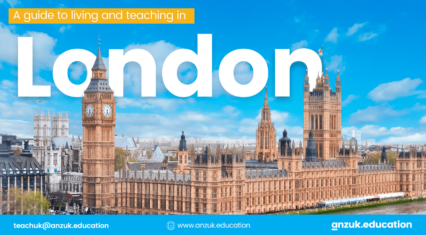Search
Get Started
By Bec Donaghy, Former London Deputy Head Teacher.
I only planned on being in London for 2 years. As a teaching graduate in 2012, I had my heart set on casual teaching in a city that allowed me to travel and explore another continent while learning my craft. I wanted to teach in a range of schools, learn about a variety of children and I was curious about how schools might do things differently on the other side of the world. And yes, I also wanted to fill my passport with stamps and make lifetime memories of European food, sites and adventures! And so, London called and off I flew.
But here I am, TEN years later, only just arriving back to the sunshine and settling back into the Sydney-sider lifestyle. I’ve spent a whole decade teaching on the other side of the world! So what changed? I fell in love with Europe, sure, but more importantly, I fell in love with the UK education system: the amount of professional learning I did and the opportunities to further my career blew my mind. The teachers who came from all walks of life were amazing to work with. And the children? Well they stole my heart from day dot. Simply put, I just could not get enough of it. There’s a story for another time about the mentors I was lucky enough to work with and learn from – but long story short: I moved into leadership roles quickly and have been working and loving life as a Deputy Headteacher (DP) for the past 7 years. I worked in many schools as a casual teacher for my first few months, then did long stints at 3 separate and very different primary schools in 3 very different areas of London. Now that I’m back in Sydney I want to encourage as many teachers as possible to set their sights on the incredible experience that is teaching in London – and I know a thing or two that will help you to be successful along the way!
Finding the right role:
I have worked closely with anzuk in my Deputy roles for the past 5 years, recruiting day-to-day casual teachers as well as for longer term posts. The good news for you is that anzuk has a great reputation in UK schools for finding the right candidate for the schools they work with. They have close working relationships with senior leaders and they are really clear about the types of personalities and skill-sets that are required for different schools.
A good thing to know at this point is that the recruitment process is quite different to NSW & the rest of Australia: Headteachers or other senior leaders often want an informal conversation and sometimes a school tour with candidates before they apply for longer-term roles. For short-term roles leaders will often want to know if you’ve had teaching experience with particular age groups or subject areas. My advice is to make sure anzuk knows what you’re looking for – small schools usually have more of a community and collaborative feel, bigger schools generally offer more diversity and a range of colleagues to learn from and alongside, with probably more opportunities for career progression, if you’re interested in that. Also ensure anzuk knows if you have any additional skills or experience teaching certain subject areas; many schools have specialist teachers in primary school now and might be looking for someone with your particular experience/interest. I have often called anzuk first thing in the morning looking specifically for a French, PE or Art teacher! If you’re not sure what you’re looking for in a school, don’t fret – after doing a few weeks of casual teaching you’ll soon get a feel for where your preferences lie.
Things to know before an interview:
Most Headteachers will want to meet you (virtually or in person) for an interview before you’re placed in a school. It is also commonplace to observe you teaching a short lesson, too. There might be a particular lesson focus given or it could be up to you.
An obvious starting point before your interview is to read as much as possible about the school from their website. All schools are also required to have a copy of their most recent Ofsted report under the ‘website statutory requirements’ section and this will give you a good insight into the school’s key priorities. Ofsted isn’t the be all and end all of what’s happening in the school though. Once you feel equipped with some of the school’s key features and priorities, try to utilise these as part of your answers. Also make sure you have a couple of questions ready to ask at the end of the interview.
You might have already read that the UK education system loves an acronym – and this is something that I personally found quite overwhelming in my early London days. I’d recommend that if you’re being asked about something that you’re unsure of that you just ask them on the spot what the acronym means: the leaders will understand that you’re an international teacher and won’t know all the lingo yet but they’d rather explain it and you make the relevant connection to the Aussie-equivalent rather than you blagging your way through an answer where it’s clear you don’t know what you’re talking about!
Finally, do some reading about safeguarding and know the importance of this question in your interview: I have seen multiple headteachers say this is a deal breaker if candidates get this wrong.
What to expect on your first day/week/month:
Be open minded about your first month in a UK school – the reality is that there is going to be information overload and you might find things a bit daunting. That’s normal though, and it is not so different once you get in front of the children. The good news is that there should be different middle leaders who will support you – make a point of connecting with your year group or phase leader early on – and don’t be shy of senior leaders. They want what’s best for the children in their school, and that means happy and confident teachers. Make that connection and you’ll be sure to have support if/when you need it.
A nice change from most Aussie schools is that you’ll get an hour (you read it right!) for lunch. I didn’t really know what to do with all that time when I first got into a UK school. Here’s my tip: have your lunch, connect with some colleagues, then USE THAT TIME WISELY! Get a bit of marking done and you’ll find the end of the day easier – and you’ll get to leave and enjoy your evening. Marking might be a bit different to what you’re used to – check in about the policy for casual teachers as this can differ from school to school.
You’ll also likely find that you have less duties than in Aussie schools. Most schools employ SMSAs who do the lunch time duty. Senior leaders usually do the morning and afternoon duties so that leaves just the morning breaks (and sometimes afternoon breaks, if you’re working with younger children) to be staffed by teachers. Another positive!
Depending on where you’ve taught in Australia, here’s a round up of other things that you should be ready for in most UK schools: the pace of the day is fast and there’s a real focus on ‘no wasted time’. The new Ofsted framework has really got schools geared up to ensure every lesson for every subject is clear and has great impact. The positive with this is that you’ll have clear direction for what you’re teaching. Don’t worry – there’s a huge focus on reading and improving ‘cultural capital’, so you’ll still get time to enjoy lovely things like story time and discussing what’s going on in the world. If you take on a block of teaching, you’ll likely be asked to attend INSET (PD) sessions – these should be around an hour, once a week. Utilise this time and make a note of everything you do – it looks great on your CV and for any future job applications! Finally, note that most schools are pretty big with emails: remember to check your emails regularly to stay on top of key communication.
Finally, and probably most importantly – be excited but ready to work with a diverse range of children – and I don’t just mean a range of ethnicities. Teaching in the UK has a huge focus on inclusive practice. You’ll come away a stronger practitioner as you will learn about working with children from all walks of life, a variety of special needs and disabilities, and so much more. Sometimes London schools (in particular) get a bad rep for having lots of children with behaviour needs, but the reality is that there are a LOT of children in the city and the vast majority go to mainstream schools – and this is a real opportunity to make a difference while learning along the way. There are professionals in each school (called SENDCos) whose job it is to support you in your work with all children so make sure you check in with them if you have any concerns.
Career progression:
Finally, you might be like me when I first arrived in London, and are happy to jump into any school and do some casual teaching. There’s lots to be learned doing that, for sure, and you’ll certainly become a better practitioner if you’re reflective about your practice and are open to new opportunities. Or you might be a bit further into your career or already know that there’s a particular route that you’d like to follow in education – the great news is that there is a huge scope for career progression in England, and recent national changes mean that this has increased further since 2019, when the new Ofsted framework came into effect.
So there you have it – my first round up on how to set yourself up for success in the UK system. I am so passionate about the wonderful experience it is, working in England so hope you find your groove quickly once you’re teaching in the UK. Let theteam from anzuk know if there are other topics you’d like info on! Good luck!
If you haven’t yet registered with anzuk please click on the following link & anzuk can chat further about your work preferences.






